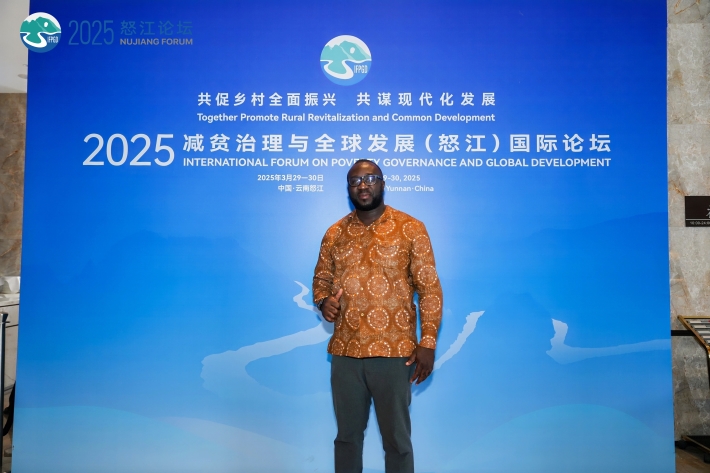|
||||||||||
| Home Top News Economy/Tech Culture/Sports China in Foreign Eyes Green Development Videos Intangible Cultural Heritages |
|
||||||||||
| Home Top News Economy/Tech Culture/Sports China in Foreign Eyes Green Development Videos Intangible Cultural Heritages |
| ChinAfrica |
| Transforming Africa Through Agriculture |
| Cooperation with China a catalyst for Africa’s agriculture |
| By Kafui Tsekpo | VOL. 17 May 2025 ·2025-05-06 |

Kafui Tsekpo, deputy chairperson of the Association of China-Africa Smallholder Agriculture in Ghana (COURTESY)
Agricultural cooperation between China and Africa holds transformative potential for poverty alleviation and rural development. China and Africa were at a similar development stage in the mid-20th century. However, China’s success in lifting itself out of extreme poverty offers critical lessons for Africa, where agriculture remains the cornerstone of economic development.
Agriculture is not merely a food-producing sector but also the foundation for industrialisation, which allowed nations like China to build their economic prowess. Africa’s vast agricultural potential - from cash crops to staple foods - can help the continent to achieve food security and drive manufacturing. Yet, decades of imbalanced development strategies have left smallholder farmers marginalised, exacerbating inequality. The solution to Africa’s ecological and economic crises lies in agricultural revitalisation. African governments need to adopt localised, culturally attuned policies.
Learning from China’s model
China’s experience demonstrates that rural development begins with securing food production before the commercialisation of agriculture, which involves creating synergies between smallholder farmers and agro-industries. For instance, by-products from livestock farming could power processing plants, while manure enriches crop fields - a circular economy approach that China has mastered. Such linkages require policy frameworks that integrate local ecosystems rather than transplanting foreign models.
While advocating for technology transfer, we should stress adaptation over imitation. Simple tools like weather prediction apps or drought-resistant seeds can empower farmers in regions like northern Uganda or Kenya’s Turkana. However, solutions must align with Africa’s diverse cultural landscapes. You cannot impose Chinese or European values; development must respect the values of each community. China’s success stemmed from leveraging its own cultural traits while embracing openness. It has shown that development can aligned with cultural values, and Africa should build on the values of its many ethnic groups rather than importing foreign values.
Cause for optimism
Despite challenges - limited access to markets, climate shocks, and underfunded research - Africa’s smallholder farmers remain resilient. China-Africa cooperation should centre on two key aspects. First, technical cooperation is essential. Africa needs to adopt both the simple and complex technologies China used to revitalise its agriculture, such as helping farmers to predict weather patterns, prevent animal diseases, and enhance crop yields. Second, agriculture should be integrated into the local ecology. African farmers should rely on local resources and simple technologies to increase production. African governments need to create access for farmers, including providing spaces to sell produce and necessary support.
Policy synergies are also vital. African countries should establish linkages between different agricultural sectors and related industries. For example, a beef-processing plant can be supported by a sugarcane plantation, and the by-products can be recycled within the agricultural system.
Small farmers have been the backbone of Africa. Their knowledge about farming is rich, but they lack the technology to make full use of it. African research institutions should place smallholder farmers at the centre of research and development, and cooperation with China should ensure that these farmers can benefit from new technologies.
In conclusion, Africa can learn a great deal from China’s agricultural development experience. By investing in agriculture, creating linkages, and using appropriate technologies, Africa can enhance its GDP, achieve food security, and alleviate poverty.
The author is Deputy Chairperson of Association of China-Africa Smallholder Agriculture, Ghana
| About Us | Contact Us | Advertise with Us | Subscribe |
| Copyright Beijing Review All rights reserved 京ICP备08005356号-5 京公网安备110102005860号 |